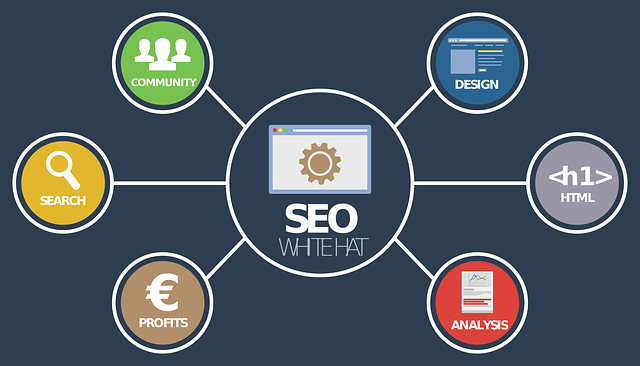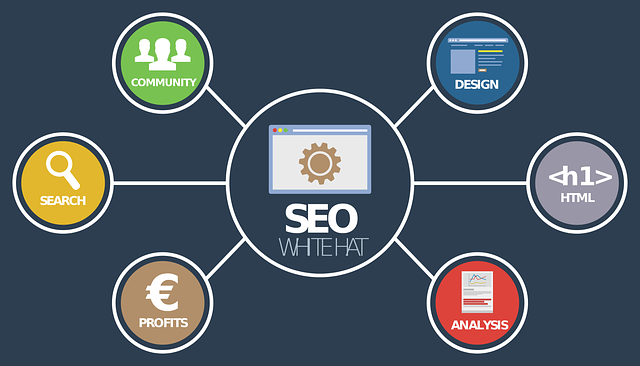Understanding your target audience is crucial for crafting a successful SEO Services strategy. Through keyword research, businesses uncover terms potential customers use during searches and create tailored content that resonates with their audience. This enhances user experience, drives engagement, and improves conversion rates. SEO Services also focus on on-page optimization (refining website structure and content), technical SEO (website accessibility & performance), building high-quality backlinks, local SEO (geographic search visibility), measuring success, staying updated with algorithms, and long-term planning to maintain online relevance.
In today’s digital landscape, a robust SEO strategy is paramount for online success. This comprehensive guide navigates the critical components of developing an effective SEO strategy, from understanding your target audience and keyword research to on-page optimization, technical SEO, and local visibility. By delving into these essential areas, you’ll gain insights into building high-quality backlinks, measuring success, staying updated with algorithm changes, and planning for long-term growth – all key to enhancing your online presence through superior SEO services.
Understanding Your Target Audience and Their Behavior

Understanding your target audience is a cornerstone in developing an effective SEO strategy. It involves delving into their online behavior, preferences, and pain points. As part of this process, SEO services often conduct thorough keyword research to identify terms that potential customers use when searching for products or services related to yours. By mapping out user journeys and analyzing search trends, businesses can tailor content strategies that resonate with their audience.
This knowledge enables companies to create valuable content that addresses the needs and interests of their target market. It also helps in optimizing website elements such as meta descriptions, headings, and URLs, ensuring they align with user queries. Ultimately, by catering to the audience’s intent and preferences, SEO strategies can enhance user experience, drive engagement, and improve conversion rates.
Keyword Research: Identifying Relevant Terms for SEO Services

Keyword research is a fundamental step in developing any effective SEO strategy. It involves identifying and analyzing relevant terms that potential customers use when searching for services online. By understanding these keywords, businesses can tailor their content to match user intent, ensuring they appear in search results for the right queries. This process requires tools and techniques to uncover not only popular but also long-tail keywords, which often have less competition and can drive highly targeted traffic.
For SEO Services, keyword research should focus on terms like “search engine optimization,” “digital marketing strategies,” and “website visibility.” These keywords indicate a clear demand for professional help in enhancing online presence. Additionally, exploring industry-specific terms related to SEO, such as “local SEO optimization” or “e-commerce ranking factors,” allows businesses to pinpoint their target audience’s needs more precisely. This strategic approach ensures that marketing efforts are aligned with current search trends and user preferences.
On-Page Optimization: Optimizing Content for Search Engines

On-Page optimization is a critical component of any robust SEO strategy, focusing on enhancing your website’s content and structure to improve search engine visibility. It involves optimizing individual web pages to ensure they align with the keywords and phrases users might search for when looking for relevant information. This process includes refining page titles, meta descriptions, header tags (H1, H2, etc.), and creating high-quality, keyword-rich content that engages both users and search engines.
Effective on-page optimization also takes into account image optimization, URL structure, internal linking, and ensuring your website is mobile-friendly. By implementing these strategies, SEO services can significantly boost a website’s ranking in search results, driving more organic traffic and increasing the likelihood of conversions or user engagement.
Technical SEO: Ensuring Website Accessibility and Performance

Technical SEO plays a critical role in any comprehensive SEO strategy, focusing on optimizing your website’s accessibility and performance. This involves ensuring that your site is crawlable and indexable by search engines, which translates to better visibility in search results. A well-optimized website has faster loading times, ensuring visitors stay longer and reducing bounce rates.
Key aspects of Technical SEO include improving website structure, implementing structured data markup, enhancing mobile usability, and optimizing for secure connections (HTTPS). These practices not only improve user experience but also signal to search engines that your site is trustworthy and valuable, boosting its authority and ranking potential. Effective technical optimizations can significantly impact the success of your SEO services, making it an integral part of any strategic digital marketing plan.
Building High-Quality Backlinks: Strategies for Effective Link Building

Building high-quality backlinks is a cornerstone of any robust SEO strategy, and it involves careful planning and execution. The goal is to secure links from reputable and relevant websites that enhance your site’s authority in the eyes of search engines like Google. One effective strategy is to create valuable content that naturally attracts links—this could be through insightful blog posts, research papers, or infographics that provide real value to readers. Another approach is to engage in outreach, building relationships with influencers and industry leaders who might be willing to link back to your site.
Effective link building also involves diversifying anchor text and ensuring that backlinks come from a variety of sources, including reputable blogs, news sites, and industry-specific directories. It’s important to remember that not all links carry equal weight; search engines consider the quality and relevance of the linking site. Therefore, focusing on acquiring backlinks from authoritative domains within your niche is key to improving your SEO services and boosting your website’s rankings.
Local SEO: Enhancing Visibility in Geographic Searches

Local SEO is a vital component of any comprehensive SEO services strategy, especially for businesses with a physical location or target local customers. It focuses on optimizing online presence to increase visibility in geographic searches, such as when users look up “restaurants near me” or “plumbers in [city name].” By leveraging specific local keywords and claiming and optimizing Google My Business listings, businesses can ensure they appear at the top of local search results.
This strategy involves crafting compelling, location-specific content that not only informs but also engages potential customers. It’s about building trust and establishing a strong online presence in the local community. By integrating strategies like local citations and creating high-quality, location-focused content, businesses can enhance their chances of ranking higher in local search results, driving more relevant traffic and ultimately increasing footfall or online orders.
Measuring and Analyzing SEO Success: Key Metrics to Track

Measuring and analyzing SEO success is a crucial aspect of any comprehensive SEO strategy. It involves tracking key metrics that provide insights into the performance and effectiveness of your SEO services. Some essential metrics to monitor include organic traffic, which measures the number of visitors coming from search engines, and keyword rankings, which show how well your website ranks for specific keywords in search results.
Conversion rates, bounce rates, and click-through rates (CTRs) are also vital. Conversion rate indicates the percentage of visitors who take a desired action on your site, such as making a purchase or filling out a form. Bounce rate represents the percentage of single-page sessions, offering insight into user engagement. CTR measures the effectiveness of your content in attracting clicks from search engine results pages (SERPs), reflecting the relevance and appeal of your website’s offerings to potential visitors.
Staying Updated with Algorithm Changes: Adapting Your Strategy

In the dynamic landscape of digital marketing, search engine optimization (SEO) strategies must evolve alongside the ever-changing algorithms of search engines like Google. Staying ahead means staying informed about updates to these algorithms, which can significantly impact a website’s visibility and ranking. SEO services professionals keep a close eye on such changes, ensuring their strategies remain effective and relevant. Regularly updating content, optimizing meta tags, and refining link building tactics are essential practices in response to algorithm shifts.
By adapting their approach, SEO service providers help businesses maintain and improve their search engine rankings. They recognize that what works today might not work tomorrow, so they stay agile, continually testing and implementing new techniques. This proactive approach is crucial for long-term success in an industry where algorithms rule the search results.
Long-Term SEO Planning: Sustainable Growth and Future-Proofing Your Online Presence

Long-term SEO planning is a strategic approach that focuses on sustainable growth and ensuring your online presence remains robust and relevant in an ever-evolving digital landscape. It involves setting clear, achievable goals that align with your business objectives while considering future trends and algorithm updates. A well-crafted long-term SEO strategy will help you establish a solid foundation for your website, making it more visible to search engines and attracting the right audience over time.
This process includes keyword research to identify terms with high search volume and low competition, which can be used as a foundation for content creation. It also involves optimizing on-page elements, such as titles, meta descriptions, and content, to ensure they are not only engaging but also aligned with best practices for search engine visibility. Regularly updating and diversifying your content portfolio is key to keeping your site fresh and appealing to both users and search algorithms. By combining these tactics with a future-oriented mindset, businesses can ensure their online presence remains competitive, driving consistent and long-lasting results from SEO services.
